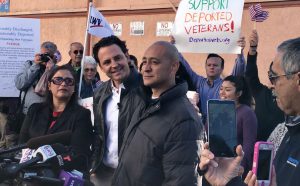Veteran Returns to US After Deportation
In what is nothing short of a Christmas miracle, a Marine veteran deported to Mexico fifteen years ago was able to return home to the United States this week.
Marco Antonio Chávez is one of three former members of the U.S. Armed Forces who were granted pardons by California Governor Jerry Brown for the offenses that led to their deportation.
An expedited proceeding for his return home followed and, finally, a court reinstated his legal permanent residence.
“I still can’t believe it, I am so happy!” said the veteran.
Chavez had served a 10-month sentence on animal cruelty charges and was then deported to Tijuana in 2002, where he has lived since. The veteran, who was brought to the U.S. as a six-month-old baby, never thought he could be kicked out into Mexico after having served in the military for four years.
“It’s unfair, that we have served in the military and still get kicked out,” he added.
Having to live all those years in Mexico led to Chavez missing out on seeing his three children grow up, as well as the birth of his first two grandchildren, who he can’t wait to meet.
A report by the American Civil Liberties Union (ACLU) criticizes the U.S. Government for deporting an “incalculable” number of veterans who would have been eligible for citizenship because it failed to properly inform them about the naturalization process.
While ACLU has documented close to 200 cases, the number of veterans expelled from the U.S. is believed to be much higher. The U.S. Government does not keep track of the number of veterans deported after committing a criminal offense.
In Chavez’s case, being granted a pardon allowed him to have his former immigration status reinstated, explained his legal team.
“This victory for Marco is truly historic,” said Jennie Pasquarella, director of immigrants’ rights and senior staff attorney for the ACLU of California. “Brown’s clemency has given Marco back his life in the United States, and given his family back their son, their father, and their grandfather.”
Former Assembly member Nathan Fletcher, leader of the Honorably Discharged, Dishonorably Deported coalition, touted this victory as unprecedented, particularly in today’s political climate.
“No one who was willing to die for this country should be deported. In a time when the immigration debate in America seems so dark, Marco Chavez’s historic legal victory and return home is a ray of light and hope,” Fletcher declared.
Chávez’s return opens the door for other veterans who are in the same situation, such as Hector Barajas, the director of a support center for deported veterans in Tijuana, who also has received a pardon from Governor Brown.
“This gives me a lot of hope,’ acknowledged Barajas, whose process differs from Chávez’s in that he has requested a hearing not for residence, but to be granted American citizenship.
The veterans’ “bunker” will be helping Chávez bring presents to his family this Christmas, but they know there could be no greater present than the joy of being together again after fifteen years.
“He can bring presents, the most amazing things you can buy, but they’ll be nothing compared to having their father home. I think that will be phenomenal for his children,” Barajas said.






